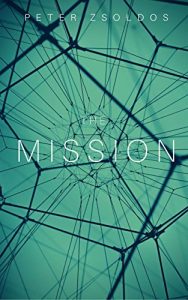 translated from the Hungarian by András Szabados
translated from the Hungarian by András Szabados
Profiford Bt.
May 6, 2018 (originally published in Hungarian in 1971)
190 pages
(see András Szabados’s essay on Zsoldos (this site) and Bogi Takács’ essay “Geographic accidents: the Gregor Man trilogy by Péter Zsoldos” (via Locus))
Péter Zsoldos (1930-1997) was a Hungarian sf author in the US-UK tradition, focusing in his work on space exploration, mind-transference, and robots. Of his most well-known work, Feladat (The Mission, 1971), Ellenpont (Counterpoint, 1973), Távoli tüz (A Distant Fire, 1969), A Viking visszatér (Return of the Viking, 1967) and A holtak nem vetnek árnyékot (The Dead Cast No Shadows, 1983), only The Mission is available now to Anglophone readers, thanks to the work of translator András Szabados.
According to Szabados in his essay on Zsoldos, the author was drawn to stories about the relationships future humans would have with space exploration and the technology necessary for that task. In Zsoldos’s novels, he says, “[y]ou will meet a disjointed mind that keeps reincarnating in the residents of an extrasolar planet, abandoned AI entities in search of their origins, an astronaut stranded on a prehistoric planet, residents of a post nuclear holocaust Earth, the god-like ruler of an ancient city state from another planet, and a deep space explorer restricted to communicating with only one person back home.” I don’t know about you, but this is definitely my kind of sci-fi.
The Mission is itself a heady mix of ideas and thought-experiments concerning “transplanted personalities,” human evolution (both on Earth and on an unnamed extrasolar planet), first contact, and advanced technology. When a ship carrying explorers and scientists from Earth lands on a populated planet, the entire evolutionary course of the planet’s inhabitants is altered. The scientists’ ethnographic research into the society of seemingly-prehistoric humans that they find is interrupted when an unexplained accident kills or maims everyone on board. Gill, the cyberneticist and only-remaining crewmember able to function (for at least a little while) uses his last hours to frantically prepare the ship’s brain to carry out a necessary part of the Mission. The ship then lures Umu, one of the primitive humans, on board (through light and sound waves) and, with a special instrument called a “consociator,” melds together its consciousness with Gill’s, turning the barely-articulate human into a sophisticated cybernetics expert in the blink of an eye. From there, the new Gill/Umu captures more of Umu’s tribe and uploads the consciousnesses of the rest of the former crewmembers into them. The Mission, then, can continue, since, after all, the original crewmembers may be dead, but their minds (experience and knowledge) live on and can deliver to Earth the information that has been so painstakingly gathered about the planet.
Zsoldos invites us into a dizzying world of multiple consciousnesses vying for the upper hand in each brain. Some uploaded crewmembers even experience the melding differently (“the fact that he perceives his dual world as a coordinate system as opposed to a DNA spiral is a sign of independence.”) With each new upload, Gill/Umu is able to perfect the transference of specific traits and specific knowledge areas without the added baggage of memories and past desires. But stripping these new dual humans of some of what makes them human sends most of them off the deep end.
And then these crewmembers discover another group of humans on the other side of the planet, humans who are much more highly-evolved and live peacefully on the water. When two members of this crew are killed and one abandons the ship to live with the primitive humans, those who remain decide to kidnap some of the highly-evolved group, and the process of uploading starts all over again, with the added tidbit that uploading a mind multiple times into different people can produce some tricky situations. Ultimately, the Mission prevails and this ship of human consciousnesses trapped in alien/human bodies on different evolutionary paths heads off back to Earth, and I won’t tell you what they find because I want you to read The Mission.
While this novel is obviously invested in ideas about alien contact and ethically-questionable technology, Zsoldos always brings the story back around to the characters’ relationships and interactions. And while Zsoldos is said to fall into the US-UK sf tradition, I detected some Lem in this story as well. Specifically, The Mission reminded me of Lem’s novel Eden (1959), in which a ship carrying a small crew of scientists and explorers crash-lands on an alien planet. How those men deal with the pressures of fear, anxiety, the unknown, and their own clashing personalities is very similar to how the crewmembers in Zsoldos’s novel react to their situation.
I want MORE ZSOLDOS, so let’s read and write about The Mission and get András to translate more of his work!
